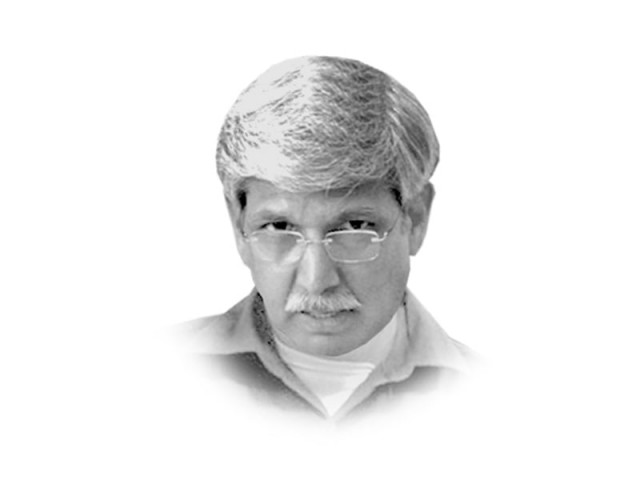Why convicting Musharraf won’t help our cause
This 24/7 spotlight may not build Musharraf into his ex-iconic self, but may bring institutions back in focus.

The writer is a defence analyst who retired as an air vice-marshal in the Pakistan Air Force
It makes for an even brilliant spectacle when the prime minister chooses to dramatically announce in parliament his intention to follow the route; and when the House lends him the adulatory support in spontaneous outpouring without yet having considered the consequences.
Now, the flip side: the PML-N brings along an unfortunate baggage of institutional confrontation that defined its previous two tenures. But then Musharraf finally got to the PML-N, and in none too savoury a manner. Even more importantly, the nation was subjected to another nine-year military/quasi-military rule. That set us back by nine years. The re-advent of democracy came with its own price tag under an NRO arrangement that made all adjustments under the rubric dubious. The five years of the PPP rule thus remained mired in a see-saw of misperceptions that could only envisage an impending doom. These resulted in another five lost years.
We were hardly done celebrating a successful democratic transition — from one democracy to another, a rarity — that we have had to begin fending for another prospective showdown, or at least live in the constant fear of one. Perceptions and misperceptions could again rule sensibilities, while demons threaten another comeback. To the institutions, it may be business as usual, but spare a thought for this hapless nation that may have breathed for 14 years but never came around to living during this period. “Our democracy”, not of these blighted politicians, is at stake.
It is said that General Ashfaq Parvez Kayani is of the right mettle and unlikely to derail democracy. I couldn’t agree more and am aware of how he has paid a significant personal price to ensure democracy has a fair chance. But, can that be said of the entire future leadership of the army? Look back at the General Jehangir Karamat affair in 1998. He, too, was of a different mind and when asked, chose to go quietly. His removal was followed by the institution of General Musharraf as the chief, and what did he promise to his colleagues on taking over: “What happened to General Karamat, will never happen again!” I am being polite, of course. Can you discount such recurrence, diabolic and all? But who paid the ultimate price — we the people and this poor nation. The drumbeaters circumambulated their new poles while yet another set of politicians found their pound of flesh — off this unfortunate nation, of course.
Why else is it a misstep? Because Musharraf is a nobody. The day he shed his uniform, he stopped being a general, officially and formally. Special laws that governed him via the Army Act gave way to the standard provisions of the Pakistan Penal Code like for any other citizen of Pakistan. If he is found guilty of violating the local laws formed in response to the constitutional guidelines, he is to be tried as a common citizen. Forlorn and isolated, centrism offered to him by this 24/7 spotlight may not build him back into his former iconic self, but it is sure likely to give fodder to the cannon in bringing the institutions back into the focus. Many relish such an opportunity, including some in Pakistan. It is this institution-bashing that is likely to give grief to the long-term interests of the people by causing a likely confrontation through institutional dismay and frustration.
Democracy has had to be literally nursed through, in some of the most testing times in the last three years. It wasn’t for a shortage of opportunities to reenact some of the sadder episodes of political adventurism; and, neither was it for the perceived emaciation of the military as an instrument of such previous experiments in our short political history; nor because the army was too tied up in a war on its western borders that it desisted from repeating its assumed responsibility to right the wrongs of our sociopolitical inadequacies through interventions. It simply was borne out of a belief that it just wasn’t right to do so. And great credit must go to the military’s leadership for sticking through some of the most intense ridicule that came its way through this most difficult period. At the end of it all, this nation won.
To fritter it all in the name of bringing to justice someone who is a part of a vicious triangle of vested venom in our past is neither relevant to our current travails nor is it likely to help the cause of our people. We have a democratic government after a democratic transition and that is what matters. We have some immediate issues to grapple with for which solutions are needed. That was the platform on which the victorious parties got their vote and that is what they will be tested against. Of these, the closure to this 12-year-old war on terror is the key to instituting the remaining agenda. That will need all hands. Without the military as an essential partner to this process, we are without those hands. A frayed civil-military relationship can only engender institutional stand-offs, similar to the 2011 stasis.
There is a lot to be learnt from the recent military coup in Egypt. Fragmented societies, unless healed by imaginative and empathic leaderships, will render themselves to repeated confrontations, especially those that reside in the historic experience of that nation. Only an inclusive and a cooperative institutional relationship can give shared stakes, making all stakeholders participants of a common journey.
Published in The Express Tribune, July 6th, 2013.
Like Opinion & Editorial on Facebook, follow @ETOpEd on Twitter to receive all updates on all our daily pieces.















COMMENTS
Comments are moderated and generally will be posted if they are on-topic and not abusive.
For more information, please see our Comments FAQ